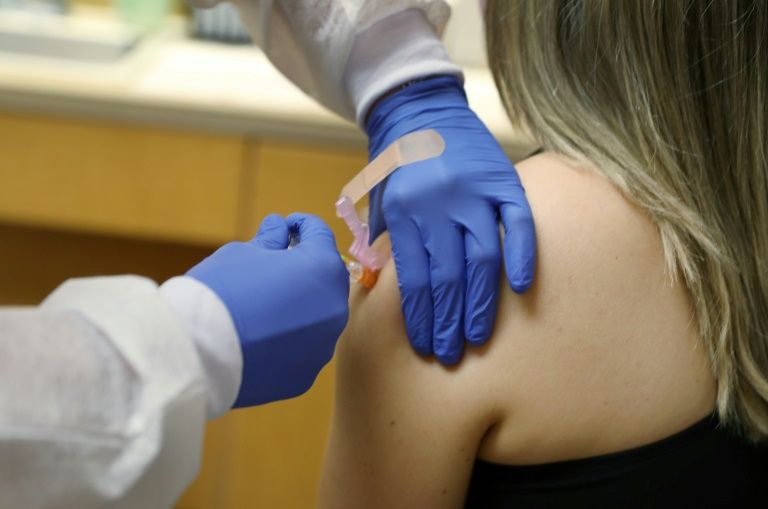Asian markets tumble as Wall St tech rout spreads
Hong Kong (AFP) – Technology and energy firms were among the big losers as Asian investors ran for the exit Wednesday following another rout on Wall Street, with vaccine and post-Brexit trade deal fears adding to the perfect storm.
US traders returned from a long weekend to resume the selling that sent shudders through markets last week as they fretted over lofty valuations of many equities that have soared from their March troughs, helped by vast central bank support.
Last week’s retreat was centred on tech giants including Apple, Microsoft and Tesla — bringing the Nasdaq’s succession of record highs to a juddering halt — but analysts said the latest selling was broadening out.
“We don’t know exactly if this is the bottom, there could be more volatility,” Laila Pence, at Pence Wealth Management, told Bloomberg TV. “We’re taking the froth out of the market.”
Tuesday’s blood-letting in New York once again saw Apple and Microsoft in the firing line, though the standout was Tesla, which collapsed 21 percent — its worst day on record.
The Nasdaq, which had risen around 80 percent from its lows this year, is now officially in correction having lost more than 10 percent from its recent high on September 2.
And the red ink seeped into Asia, with Tokyo, Hong Kong, Shanghai, Seoul, Taipei, Manila and Wellington all down more than one percent, while Sydney shed more than two percent. Singapore and Jakarta were also in negative territory.
In Tokyo, SoftBank dived more than seven percent on worries about its exposure to tech giants after it was revealed the conglomerate had made huge derivative bets ahead of the latest sell-off. It has lost around 14 percent this week so far.
While technology firms in the region were taking a hiding, energy firms were also in the cross-hairs after oil prices suffered their heaviest losses since the early days of the pandemic.
The commodity was in retreat on concerns about demand as the global recovery stutters and after the US summer holiday season — when people traditionally take to the road — came to an end.
There are fears OPEC will begin picking up production soon, after an output cut put in place to support the market earlier in the year.
Both contracts were slightly lower Wednesday.
– Vaccine blow –
“Selling pressure is a little broader as the concerns in the tech sector are extending across broader markets and impacting risk sentiment,” said JP Morgan Asset Management strategist Kerry Craig.
“The rise in safe havens, such as the US dollar, Japanese yen and gold, are further evidence of more defensive investor positioning.
“A market fuelled by central bank largesse, economic surprises and record earnings beats in the last few months was never going to maintain its heady pace forever. Market tremors are a normal, if uneasy, part of investing and not all shocks are a warning of an impending collapse in risk sentiment.”
Meanwhile, hopes for an early vaccine took a jolt when pharma giant AstraZeneca said it had “voluntarily paused” a randomised clinical trial of its candidate in what it called a routine action after a volunteer developed an unexplained illness.
The company, which is developing the drug alongside the University of Oxford, is a frontrunner in the global race for a Covid-19 vaccine.
It called the move a “routine action”, adding that in large trials, illnesses will sometimes happen by chance but must be reviewed independently.
Traders were also fretting over the possibility that trade talks between Britain and the European Union will end without a deal after Prime Minister Boris Johnson said that if an agreement was not struck by October 15 then there would not be one.
Later, it was confirmed that the head of the UK government’s legal department had resigned over Johnson’s last-minute changes to Britain’s EU Withdrawal Agreement, which Northern Ireland Secretary Brandon Lewis admitted broke international law in “tightly defined circumstances”.
The pound has lost around four percent in September and is below $1.30 for the first time in a month.
“I am astonished that we are still talking about Brexit, four years, two months, and 17 days after the referendum,” said Stephen Innes at AxiCorp.
“There is still no deal or even much evidence of good faith negotiation. It is beyond stupid at this point and the rhythmic sound of traders bashing their heads against their keyboards suggests they too were far too complacent as the pound remains in a world of hurt.”
– Key figures around 0250 GMT –
Tokyo – Nikkei 225: DOWN 1.6 percent at 22,908.97 (break)
Hong Kong – Hang Seng: DOWN 1.6 percent at 24,237.95
Shanghai – Composite: DOWN 1.4 percent at 3,270.42
West Texas Intermediate: DOWN 0.9 percent at $36.43 per barrel
Brent North Sea crude: DOWN 0.7 percent at $39.52 per barrel
Pound/dollar: DOWN at $1.2963 from $1.2981 at 2050 GMT
Euro/pound: UP at 90.86 pence from 90.70 pence
Euro/dollar: UP at $1.1778 from $1.1775
Dollar/yen: DOWN at 105.92 yen from 106.00 yen
New York – Dow: DOWN 2.3 percent at 27,500.89 (close)
London – FTSE 100: DOWN 0.1 percent at 5,930.30 (close)
Disclaimer: Validity of the above story is for 7 Days from original date of publishing. Source: AFP.


